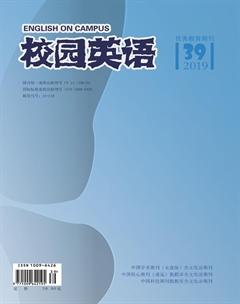A Comparative Study of Name Cultures between Chinese and English
【Abstract】 Names reflect culture. Name culture is one very important part of a certain language. This paper makes a close comparative study of name cultures between Chinese and English, including similarities and differences.
【Key words】comparative study; name culture; similarities and differences
【作者简介】张艺玲(1979.11-),女,汉族,广东化州人,大连海洋大学,本科,讲师,研究方向:大学英语教学、跨文化交际。
【基金项目】1. 辽宁省国际教育“十三五”科研规划课题,项目名称:大学英语教学中学生的中国文化传播能力培养研究(编号:18LNGJ014)。大连海洋大学“课程思政”教学改革试点项目,项目名称:大学英语II(编号:JG2018KC05)。
According to the Dictionary, a name is “word or words by which a person, an animal, a place or a thing is known and spoken to or of” (Hornby, 976). Factors concerning names between different cultures may be similar or different. Conducting a comparative study of the similarities and the differences of names cultures between Chinese and English, this paper tries to make Chinese and English cultures understood better.
On one hand, due to the similar progress of humanity, the two cultures have common grounds, the most distinguished one being sexism. In both Chinese and American cultures, men are prior to women. A woman is valued mostly for the attractiveness and sexiness of her body, whereas a man is valued for his physical strength and talent. Thus, typical names for Chinese girls are秀(elegant), 花(flower),媛(elegant), 淑(kind and gentle), 玲(sound of jade), 香(fragrant),珍(treasure),巧(smart), and so on. And typical names for English girls are Crystal (a precious stone), Lily (a flower), Violet( a small purple flower), Shelly ( a shell) , Rosemary (a herb), Angelia (Angel), Alisa (Princess), Anne(kind and elegant), Bella (beauty), etc. However, typical examples of Chinese boys names are山 ( mountain), 海 (ocean), 龙 (little dragon), 虎 (tiger), 富 (riches and honor),强 (strong and excellence), 钢 (firm and strong), 智 (wisdom),辉 (splendor), 勇 (courage), etc. And typical names of English boys include Martin (the God of War), Seward (victory guard), Basil (king), Leo (bravery), Truman (Faith), and the like.
On the other hand, due to varied value cultures and social reality, there are some differences between the two cultures. First of all, because of Chineses collectivist-orientation and Westerners individual-orientation, the order of family name and given name are different. In the West, given name is put prior to family name, while in China where family is stressed as the basic unit of social structure, and family name comes first. Secondly, although both of them create family names from animals, plants, weather conditions, geography, occupations, place names and colors, there are still some differences in origin of family name. One distinction is that some English family names were originally nicknames, most of which were personal descriptions or physical features of people adopting those names while Chinese ones not. For example, the ancestor of Longfellow must be a long fellow, and Armstrong is a descendant of a person with a strong arm. Other examples are Bald, Small, Bunch, Ballard, Short and Grant. However, Chinese people rarely create family name like this. They have unique ways. One of them is to make the name of feoff as the family name in early dynasties. For example, in the West Zhou Dynasty, the royal family used to divide the whole kingdom into many small feoffs such as “Qi (齐)”, “Zhou (周)”, “Yan (燕)”, “Lu(鲁)”, and distribute them to vassals. Then the offspring of these vassals made the names of the feoffs their family names. Hence came the family name QI, ZHOU, YAN, LU, and many others. Thirdly, the difference comes from High vs. Low Power Distance. Chinese people have taboo in naming while Western people do not. In China, people avoid calling and naming the name of superiors such as the saints, the older generations, and the emperor regnant, although nowadays Chinese people have become much tolerant about it. However, the practice that members of younger generation use members of older generations given names is very common among Westerners. The famous American black leader Martin Luther King, Jr. is named after his father Martin Luther King, Sr.. In Britain, the prestige families, including the royal family, likes to inherit names.
In short, names are culturally specific. The personal name is not only a linguistic phenomenon but also a cultural one. Comparative study of the hidden rules and facts in names help Chinese and English culture better understood.
References:
[1]黃维合.英语姓名与文化[J].山东师大外国语学报,2001.

